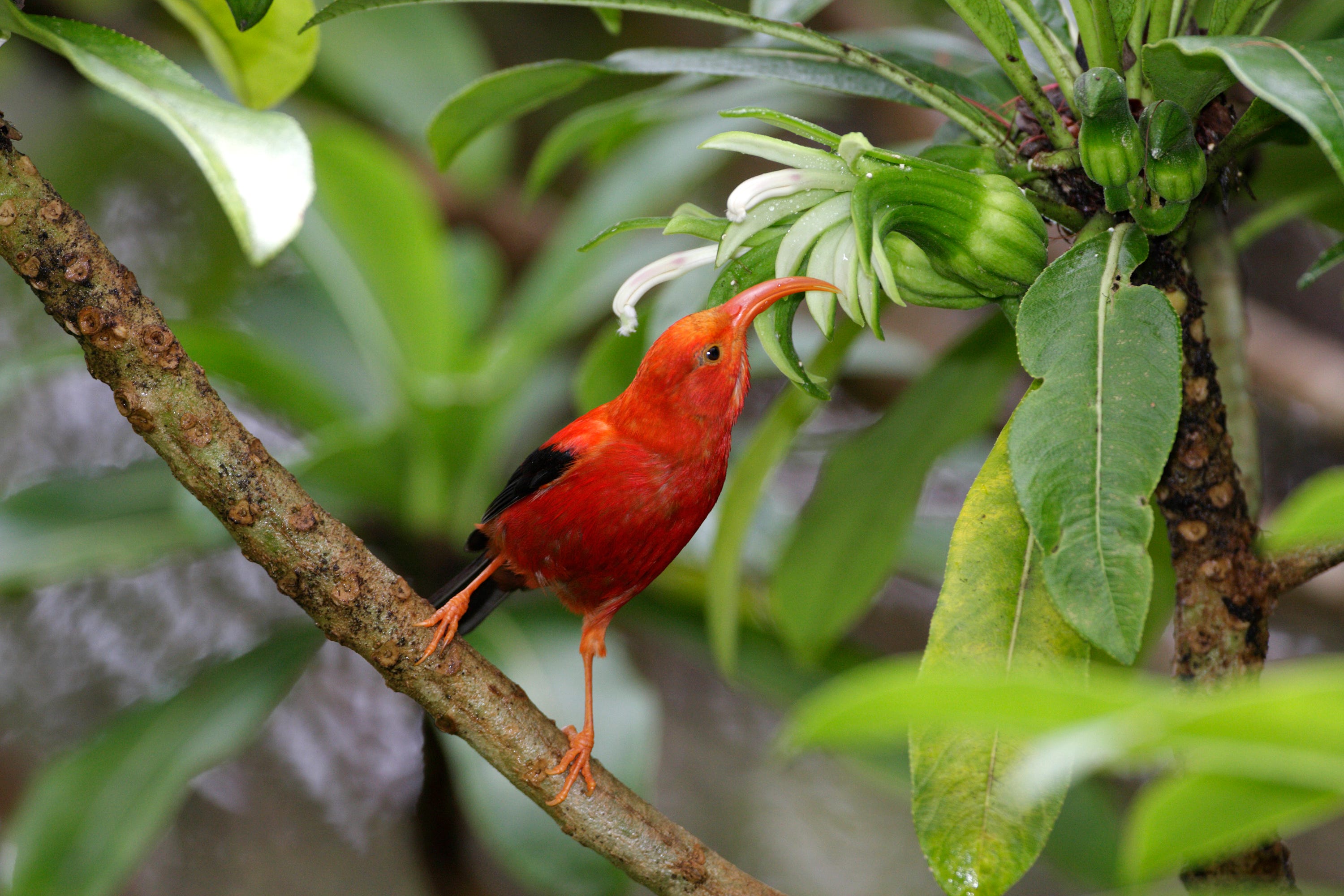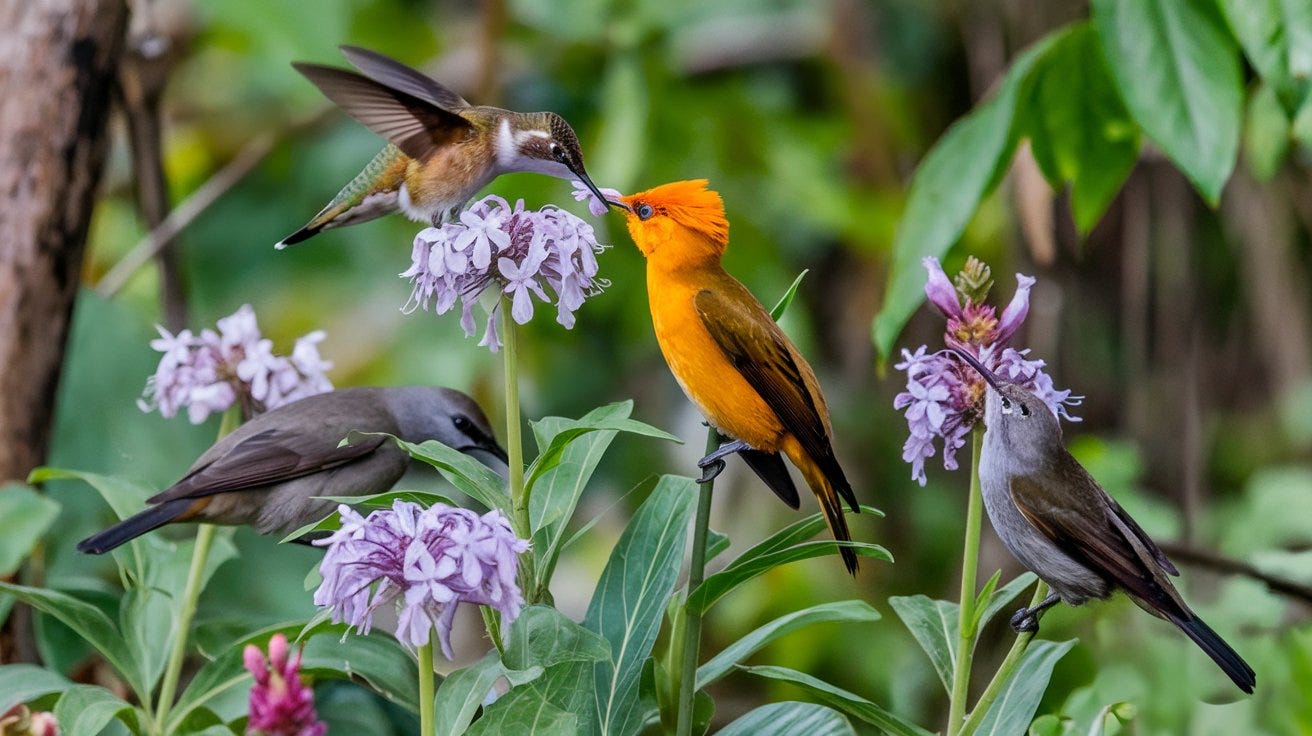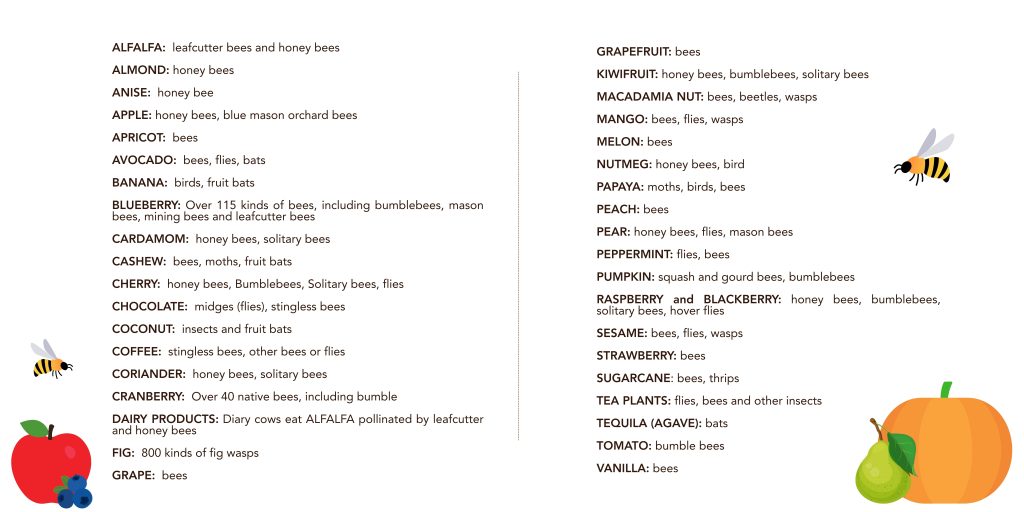Have you ever wondered how some of your favorite fruits grow? The secret often lies in tiny helpers you might overlook—birds.
These feathered friends play a surprising role in pollination, helping plants produce the juicy fruits you love. Understanding which fruits depend on bird pollination can change the way you see your garden, your food, and even the environment. Keep reading, and you’ll discover the fascinating connection between birds and the fruits on your table.

Credit: www.calloways.com
Role Of Birds In Pollination
Birds play an important role in pollination. They help plants reproduce by moving pollen from one flower to another.
Some fruits depend mostly on bird pollination to grow. Without birds, these fruits might not develop well.
How Birds Transfer Pollen
Birds transfer pollen by visiting flowers to drink nectar. Their heads and bodies pick up pollen grains during this visit.
As birds move to the next flower, they drop pollen on the flower’s reproductive parts. This helps the flower produce seeds and fruit.
- Birds brush against flower stamens and pistils
- Pollen sticks to feathers or beaks
- Pollen is carried to other flowers
- Pollination leads to fruit and seed growth
Birds Vs. Insects In Pollination
Birds and insects both pollinate flowers, but they work in different ways. Birds usually visit larger, bright flowers with lots of nectar.
Insects like bees visit many small flowers quickly. Birds travel longer distances and can pollinate plants that insects may not reach.
- Birds prefer big, colorful flowers
- Insects visit many small flowers fast
- Birds can fly long distances
- Insects usually stay close to one area
Bird Adaptations For Pollination
Birds have special body parts that help with pollination. Their beaks and feathers pick up pollen easily while they feed.
Many birds have strong wings for flying between flowers. Their sharp eyesight helps them find colorful flowers with nectar.
- Long beaks for reaching nectar deep inside flowers
- Feathers that trap pollen grains
- Strong wings for flying between plants
- Good vision to spot bright flowers
Common Fruits Pollinated By Birds
Birds help many fruits grow by carrying pollen from flower to flower. This process is called bird pollination. It helps plants produce fruit and seeds.
Some fruits depend more on birds than insects or wind. Birds like hummingbirds and honeyeaters are important pollinators for these fruits.
Berries And Their Bird Pollinators
Berries often attract birds with their bright colors and sweet nectar. Birds visit the flowers to feed, spreading pollen as they move.
Common berries pollinated by birds include blueberries, elderberries, and currants. These fruits grow well where bird pollinators are active.
- Blueberries rely on hummingbirds and sunbirds
- Elderberries attract thrushes and waxwings
- Currants are pollinated by small nectar-feeding birds
Tropical Fruits Relied On Birds
Tropical fruits often depend on colorful birds like hummingbirds and toucans. These birds visit flowers for nectar and help pollinate them.
Examples include passion fruit, guava, and mango. Birds help these fruits grow in warm, tropical areas.
- Passion fruit flowers are pollinated by hummingbirds
- Guava depends on birds like honeycreepers
- Mango flowers attract sunbirds and other nectar feeders
Unique Fruits With Bird Pollination
Some fruits have special flowers that only certain birds can pollinate. These unique plants need specific bird species to thrive.
Examples include the kiwi fruit and some orchids that produce edible fruits. Birds like honeyeaters and sunbirds are key pollinators.
- Kiwi fruit flowers are pollinated by bees and birds
- Orchid fruits rely on specific bird species for pollination
- Some wild fruits in Australia depend on honeyeaters
Bird-pollinated Fruit Plants
Many fruit plants depend on birds for pollination. Birds help transfer pollen from one flower to another. This process helps plants produce fruits and seeds.
Bird pollination is important in many ecosystems. It supports fruit production and helps keep bird populations healthy by providing food.
Flower Traits Attracting Birds
Bird-pollinated flowers have special traits to attract birds. These traits make it easy for birds to find and feed on the flowers.
- Bright colors like red, orange, and yellow catch birds’ attention.
- Flowers often have tubular shapes suited to bird beaks.
- They produce lots of nectar as a food reward for birds.
- Strong, sturdy stems support bird landings during feeding.
- Flowers usually have little or no scent since birds rely on sight.
Examples Of Bird-pollinated Plants
Many fruit plants rely on birds for pollination. Some are common in gardens and wild areas.
- Hibiscus: Large, colorful flowers attract hummingbirds.
- Passionfruit: Needs birds to move pollen between flowers.
- Guava: Birds visit flowers and help spread pollen.
- Fuchsia: Bright flowers that hummingbirds love.
- Blueberry: Some species attract birds for pollination.
Pollination Timing And Bird Activity
Birds visit flowers at certain times of the day. Flower opening often matches bird activity for better pollination.
Many bird-pollinated flowers open during daylight. Birds are active in the morning and afternoon when flowers produce nectar.
- Flowers open during the day to attract daytime birds.
- Nectar flow peaks when birds are most active.
- Some flowers close at night to save energy.
- Timing helps plants get the best pollination from birds.

Credit: medium.com
Ecological Importance Of Bird Pollination
Bird pollination helps many plants grow fruits and seeds. Birds carry pollen from one flower to another. This process supports plant life and helps nature stay healthy.
Many fruits depend on birds for pollination. Understanding this role shows how birds keep ecosystems balanced.
Biodiversity And Fruit Production
Bird pollination increases plant diversity. Different bird species pollinate different flowers. This variety helps many types of fruits grow.
- Supports rare and native plants
- Improves fruit quality and quantity
- Maintains healthy forest and garden ecosystems
- Encourages genetic diversity in plants
Bird Pollination In Different Ecosystems
Bird pollination occurs in many places. Tropical forests, deserts, and mountains all have birds that pollinate flowers. Each ecosystem depends on these birds differently.
| Ecosystem | Common Bird Pollinators | Fruits Dependent on Birds |
|---|---|---|
| Tropical Rainforest | Hummingbirds, Sunbirds | Banana, Passion Fruit |
| Desert | Hummingbirds, Honeyeaters | Prickly Pear, Saguaro Cactus Fruit |
| Mountain Regions | Honeycreepers, Flowerpeckers | Blueberry, Mountain Ash Berries |
Impact On Agriculture And Food Security
Bird pollination helps farmers produce fruits. Many crops rely on birds to grow well. This support is important for food supply and security worldwide.
- Increases crop yields naturally
- Reduces need for artificial pollination
- Supports sustainable farming methods
- Protects food variety and availability
Threats To Bird Pollinators
Birds play a key role in pollinating many fruits. Some fruits depend on birds to transfer pollen from flower to flower. Without bird pollinators, these fruits may not grow well.
Bird pollinators face many threats that reduce their numbers. These threats harm the birds and affect fruit production worldwide.
Habitat Loss And Fragmentation
Birds need natural habitats to live and find food. When forests and wild areas are cut down, birds lose their homes. This makes it hard for them to survive and pollinate plants.
Breaking habitats into small patches stops birds from moving freely. They cannot reach as many flowers, which lowers pollination rates.
Climate Change Effects
Changes in weather patterns affect bird behavior and migration. Birds may arrive too early or late for flowering seasons. This mismatch reduces fruit pollination success.
Rising temperatures can also harm bird health. Heat stress and food shortages make it harder for birds to thrive.
Human Activities And Pollution
Pesticides and chemicals from farms and cities harm birds directly. Poisoned birds lose their ability to pollinate flowers. Pollution also damages the plants birds rely on.
Building roads and houses disturbs bird habitats. Noise and light pollution confuse birds, affecting their feeding and flying habits.
Conservation Efforts For Bird Pollinators
Birds play a key role in pollinating many fruits. Protecting them helps keep these fruits growing. Conservation efforts focus on helping bird pollinators survive and thrive.
Many fruits depend on birds to move pollen from flower to flower. Without birds, these plants may produce less fruit or none at all. People work to protect bird habitats and raise awareness.
Protecting Habitats
Bird pollinators need safe places to live and find food. Protecting forests, wetlands, and natural areas helps birds survive. Habitat loss is a big threat to many bird species.
Conservation groups create bird reserves and protect large green areas. These places give birds shelter and plenty of flowers to pollinate. Clean water and safe nesting spots are also important.
Promoting Native Plant Growth
Native plants attract local bird pollinators better than non-native ones. They provide the right nectar and seeds that birds need. Planting native flowers supports bird health and fruit production.
Gardens and farms can use native plants to help birds. This creates a natural food source and encourages birds to stay nearby. Native plants also help keep the local ecosystem balanced.
- Choose native flowers for gardens and farms
- Avoid pesticides that harm birds and plants
- Plant a variety of species for year-round food
Community Involvement And Awareness
Communities can help protect bird pollinators by learning about their importance. Education programs teach people how birds help fruit plants grow. This knowledge encourages care for birds and nature.
Local groups organize bird-watching and planting events. These activities bring people together to support bird habitats. Everyone can play a part in saving bird pollinators.
- Join local conservation groups
- Plant bird-friendly gardens
- Share information about bird pollination
How To Support Bird Pollination At Home
Many fruits depend on birds to help pollinate their flowers. Birds carry pollen from one flower to another. This helps fruits like blueberries, guavas, and figs grow well.
You can help bird pollination at home by creating a friendly space for birds. This makes it easier for birds to visit your garden and pollinate plants.
Planting Bird-friendly Gardens
Plant flowers and trees that attract birds. Choose native plants that provide nectar and fruits. These plants invite birds to your garden often.
- Use plants like trumpet vine, honeysuckle, and salvia
- Grow fruit trees like guava, fig, and blueberry
- Include flowering shrubs with bright colors
Avoiding Harmful Chemicals
Do not use pesticides or herbicides in your garden. These chemicals can hurt birds and reduce pollination. Choose natural ways to protect your plants.
Use homemade sprays or attract helpful insects to keep pests away. This keeps your garden safe for birds and other pollinators.
Providing Water And Shelter
Birds need water and safe places to rest. Provide shallow water dishes for drinking and bathing. Keep water clean and fresh.
Offer shelter with trees, shrubs, or birdhouses. These spots protect birds from weather and predators. A safe space encourages birds to visit often.

Credit: medium.com
Frequently Asked Questions
What Fruits Rely On Bird Pollination?
Bird pollination mainly supports fruits like mangoes, guavas, and bananas. These fruits depend on birds to transfer pollen, enhancing fruit quality and yield.
How Do Birds Help Fruit Pollination?
Birds transfer pollen by visiting flowers for nectar. Their movement from flower to flower ensures fertilization, promoting fruit development and biodiversity.
Which Birds Are Key Pollinators For Fruits?
Hummingbirds, sunbirds, and honeyeaters are primary bird pollinators. These birds have specialized beaks suited for accessing nectar and carrying pollen.
Why Is Bird Pollination Important For Fruit Crops?
Bird pollination increases fruit set and genetic diversity. It also improves crop resilience and supports sustainable agricultural ecosystems.
Conclusion
Birds play a vital role in pollinating many fruits. Their involvement ensures biodiversity and food supply. Fruits like papayas, bananas, and some berries depend on bird pollination. Without birds, these fruits might struggle to grow. Protecting bird habitats can sustain this natural process.
This relationship highlights nature’s delicate balance. Recognizing it helps us appreciate bird pollination. Encouraging bird-friendly practices benefits ecosystems and agriculture. Next time you enjoy these fruits, think of the birds. Their contribution is invaluable. Let’s support and protect these essential pollinators.

